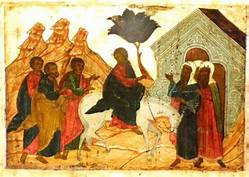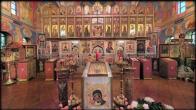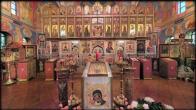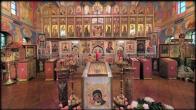You are here
HOSANNA IN THE HIGHEST, BLESSED IS HE THAT COMETH IN THE NAME OF THE LORD!

On the next day much people that were come to the feast, when they heard that Jesus was coming to Jerusalem, Took branches of palm trees, and went forth to meet him, and cried, Hosanna: Blessed is the King of Israel that cometh in the name of the Lord. And Jesus, when he had found a young ass, sat thereon; as it is written, Fear not, daughter of Sion: behold, thy King cometh, sitting on an ass's colt. These things understood not his disciples at the first: but when Jesus was glorified, then remembered they that these things were written of him, and that they had done these things unto him. The people therefore that was with him when he called Lazarus out of his grave, and raised him from the dead, bare record. For this cause the people also met him, for that they heard that he had done this miracle
(John12:12-18)
"We magnify Thee, O Christ the Giver of Life, Hosanna in the highest and we cry aloud to Thee, blessed is he that cometh in the name of the Lord!" With these words, the Holy Orthodox Church invites all of us, on the Feast of the Entry into Jerusalem to also magnify and greet our approaching Lord and Savior Jesus Christ.
It was already the fourth approaching Pascha that the Lord went to celebrate in Jerusalem. However, on the earlier three, Christ had come as a private individual, and many Jews had not even known that He was in the city for the Feast. This time, Christ chose to do something entirely different — to enter with glory. This was height of glory to which the Savior’s life on earth had risen, so that immediately afterward, it might come to a bloody end. Never had the humble Galilean Prophet’s star of greatness shone so brightly! Never before had His Name been pronounced with such delight and hope by thousands of lips. Never before had such a multitude surrounded him, ready to heed and bow down before Him and to instantly go wherever he asked. When he was come into Jerusalem, all of the city was moved (Matthew 21: 10). And it was not just Jerusalem, but all Judea, assembled in the city for the feast, that came out to greet Jesus. This time, the Lord did not turn away from fame and glory, or from the raucous expressions of amazement and reverence. Ordinarily, He avoided noise and human gossip, and he never wanted people to pay him honor or bow down before him, for that was something absolutely unnecessary to His work. However, this time He did not stop the shouts of jubilation, and when the maddened Pharisees demanded of Him that He stop the disciples from singing his praises, the Lord answered, "I tell you that, if these should hold their peace, the stones would immediately cry out." (Luke 19: 40) How is one to understand such a festive meeting of Christ the Savior? The Lord Himself explains by saying, "The hour is come, that the Son of man should be glorified." (John 12: 23)
Of what hour, and of what glorification does Christ speak? Here is what we should note first of all. Whenever the Roman governor (or emperor) would return to the Eternal City after a victorious battle with its enemies, he usually rode in a gilded carriage pulled by a team of four white purebred horses; a statue would hold a gold wreath above his head. All around, the sound of the returning armies thundered. At the front of the column, they led the hosts of prisoners and carried the spoils of war. How little did the meek and humble Savior, seated upon a little donkey, resemble the Roman emperor, as he took little steps upon the flagstones of the Jerusalem road. How strangely dissonant was the appearance of the Great Prophet from that glory wreathed around him by the cries of the surrounding multitudes. It was peasants that usually rode donkeys into the city. Of course the Lord intentionally directed that His disciples bring Him a donkey for His grand, festive entry. Wearing an ordinary chiton and a robe unadorned with military medals, without a wreath of victory upon His Head, and seated upon an ass, the Savior must have presented a picture of peace and meekness. To the casual observer, to anyone unconvinced of His identity, it was obvious that this Prophet from Galilee would never be the mighty warrior the people imagined the future Messiah to be. Doubtless, it was this thought that the Lord wanted to evoke. His coming was full of glory and greatness, but it was the splendor of moral greatness, and not earthly, vain splendor. Now, he was once again teaching his followers a visual lesson – that His Kingdom was not a kingdom of external splendor, but a Kingdom that was entirely spiritual, great in its internal beauty and holiness. But the Savior’s face was sorrowful. His face did not express joy and superiority — His eyes were brimming with tears. What was Jesus mourning? He was mourning for Jerusalem, for those people who today were crying "Hosanna," i.e. salvation, and who, just a few days later, would cry out other words: Crucify Him! Crucify Him! "His blood be on us and on our children." (Matthew 27: 25) That is why Christ, greeted with glory, wept as he entered Jerusalem. Yet, why had such a crown assembled? Why did such a multitude of people come out to meet Christ, to joyously welcome Him and to line his path with their clothing and with branches of palms? The answer is quite simple. The night before, a wonderful miracle had taken place, a miracle wrought by the Lord in Bethany. It was there that Christ had resurrected from the dead His friend Lazarus, one who had already lain for four days in the tomb. All of Jerusalem and the surrounding area had instantly heard of the great miracle, and the people impatiently waited in amazement to see that Great Miracle-worker.
This should be such a warning to us! On hearing of something unusual, we too get a burning desire, and we sincerely run to see, to hear, and to find out all about it. It is frightening when we go astray after listening to false prophets. It is no less frightening when, having come to know Christ, and after having recognized Him to be the true Messiah and Savior, we later cool to Him, the flame of faith in our souls goes out, and we are ready to forget, to betray Him, and to join our voices to those who called out to Pilate "Crucify Him!" We, like those Jews of ancient times, are blind to the light of Christ’s love! Christ came to deliver us from death, and we hand Him over to death! Someone might protest: "What are you talking about? Do we actually betray Christ unto death? It was those Jews in Jerusalem 2,000 years ago that betrayed Christ. We, after all, are living in a different age. Christ is glorified, He was resurrected, He ascended into Heaven and He sits at the right hand of the Father. In no way can we crucify Him today." If that is what we think, we are greatly mistaken, for today, by sinning, we continue to crucify Christ.
Let us turn our attention to those two exclamations issuing from people’s lips. There is today’s exclamation, "Hosanna," and the one we will hear during Passion Week on Great Thursday and Great Friday. Those exclamations are called out in our lives as well. When do we say "Hosanna?" When our soul opens up to God, when we recognize our sinfulness, when we see our sin, and we rush to bring true repentance to God and to change our life, adjusting and regulating it according to Christ’s Commandments, in order to set it on the path of the virtues. Then, truly, "Hosanna in the highest, blessed is He that cometh in the name of the Lord," sounds in our souls. Blessed is Christ, coming into my heart, into my soul, into my life. I am just as ready, O Lord, to come out to meet You, ready to spread out before You the garments of my virtues and the God-pleasing works I have done. When we act in that way, we are saying "Hosanna." But let’s ask ourselves (and try to give an honest, unhypocritical answer) the question: "Does that exclamation often sound in my life? Does not "Crucify Him, Crucify Him" sound out more often in my soul? That is precisely what my soul cries out to God when I continue to stagnate in my sins; when I continue to be indifferent to the state of my soul, and do not care whether it is healthy or sick, or perhaps, already dead; when what is happening around me doesn’t matter to me, when I am concerned only with my own visible success; when I don’t see the person who is right beside me; when I am blind to his needs and I remain callous, selfish, not wanting to even think that someone might be in need of my human warmth, my kind words, my sympathetic glance. In short, when I forget my Christian calling, I join the crowd of those Jews who in anger and hatred cried out to Pilate "Crucify Him, crucify Him."
Such are the vitally important questions the Feast of the Lord’s Entry into Jerusalem poses to us; it calls us to reflect on them on the eve of Passion Week and of our Lord’s passion, to comprehend His love, His enormous sacrifice. Just consider His limitless love for mankind! If was because of that love that He, our Lord and Creator, became like us, His creation. Not only does he become Man, but takes up His Cross and ascends Golgotha, there to be crucified together with our sins, to redeem the sins of each - those who live, have lived, or are to live on earth. Through that crucifixion, through that sacrifice, we are liberated from slavery to sin and are graced with the possibility of being like unto God. The Lord loves us that much!
The Lord challenges everyone to follow Him. He calls us to be co-participants in His salvific sufferings, so that we might then share in the joy of His Resurrection. For without pain in our hearts, without spiritually sharing in the Savior’s Passion, we will not experience the profound, true Paschal joy.
On Great Saturday, we will come to bless eggs, cheese paskhas, kulichi, and other Paschal foods. How else could it be? Without them, Pascha would not be Pascha. But let’s ask ourselves: Having blessed the Paschal foods, will we also bless our own souls? Have we blessed ourselves during this past Great Lent; have we become better, cleaner? With what attitude will we greet Christ’s glorious Resurrection? Did not Christ come to take on a podvig for our salvation? Are we being saved? Do we make use of the fruits of that podvig, or does it all just pass us by? Do we not continue to run around in circles, utterly tied up in the vanities of the world, finding neither time nor desire to stop, to wrench our focus away from the world? Perhaps I will occasionally drop into the church and light a candle, or maybe I will even stand through a service, but doesn’t my going in seem to be a mere formality? After all, if hatred, envy, indifference, pride, arrogance toward those around me continue to live in my heart, I am not using the fruits of the podvig the Lord performed for me. My soul, uncleansed of corruption does not strive towards God, and I am not taking advantage of the possibility granted me. Тhen I cannot hope for salvation! Today, it is my wish that each of us not only cry out "Hosanna in the highest" to God, but also that each of us should cry out from the depths of his heart "Lord, come, for I am perishing. I continue to live in my sin, but I confess my sinfulness, and I know that I cannot live like this. Help me, Lord! Give me strength to worthily greet Thee as my Messiah and Savior, Thou Who comest for my salvation! Lord, give me the strength to bear my Christian calling in this world, and I will make every possible effort to answer Thy love with my own sincere love!"
Brothers and Sisters, such are the feelings, attitudes, and emotional experiences that we should be possessed of, not only today, not only during the coming Passion Week, not only on the day of the Lord’s Pascha, but in all the days of our earthly life. Then, the event of the Lord’s Entry into Jerusalem, His suffering on the cross, and His death will have been useful and salvific for us. In celebrating this Feast, that is the lesson the Holy Orthodox Church teaches all of us. We hold in our hands branches of pussywillows. Because they retain some of the moisture they drew from the roots of the bush or tree on which they grew, they will continue to live for some time. Yet, in time, they will dry up. For them to have life, they must draw nourishment from the juices drawn from their roots. So we must not be severed from our roots, we must not fall away from Christ and from His Holy Orthodox Church.
God grant that each of us might be a worthy child of his Lord, and a faithful child of His Church. Let us love our Church, let us believe in our Church! Let us come to church not only on major feasts, but as often as possible, remembering that just as pure life-giving water pours forth from a spring, here God’s grace, without which life is pointless, pours out for everyone. During Passion Week, let us lay aside all our domestic affairs. In the days prior to Christ’s Glorious Resurrection, let us strive to walk with Christ, inseparable. The Lord calls us to do that. God grant that at the services to be celebrated, we will have the opportunity to take part in the Passion, which the Lord endured, for us all.
As we enter into the days of Passion Week, into the Passion of our Lord, let us constantly be mindful of it, both at home and at work. To the extent possible, may the sufferings of Christ be our own as well. Let us remember that the Lord entered Jerusalem with tears in his eyes. He wept for the city and for the people who did not recognize His coming. May we not be like those irrational people! How wonderful it would be to see on the Lord’s face not tears, but a look of joy. Joy over the fact that we, His children, are striving towards him; of course children who are sometimes irrational, who commit sins and make mistakes, but his children, who love their Lord and cannot imagine life without Him. May Christ’s eyes be brimming not with tears but joy. That depends upon us alone. Let us strive and apply all of our efforts. "Hosanna in the highest, blessed is he that cometh in the name of the Lord!"
Archpriest Victor Potapov
PARISH LIFE
RECENT VIDEOS
Address of our Cathedral
Subscribe to our mailing list
While all the materials on this site are copyrighted, you may use them freely as long as you treat them
with respect and provide attribution on the Russian Orthodox Cathedral of St.John the Baptist of Washington DC.









